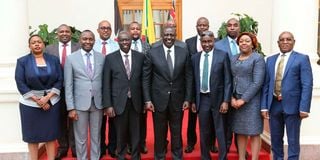
President William Ruto together with Deputy President Rigathi Gachagua at State House, Nairobi, after a meeting with MPs from the Jubilee party led by Nominated MP Sabina Chege and EALA MP Kanini Kega on January 26, 2023.
What a difference a year can make. Twelve months ago, hustler supporters and politicians were still euphoric from election outcomes. By last December, the presidential petition was long concluded, cabinet appointments made and government formed.
Still, the campaign kool aid had not worn off. In churches, on television and in radio talk shows, Kenya Kwanza politicians would lecture us on how the handshake had ruined the economy, and how they were going to fix it in quick time, by implementing the plan.
Generic and vague, the plan could have been referring to anything. Pressed for details, KK politicians would offer the hustler fund and subsidised fertilizer as key planks of the plan. In the months to come that vagueness would surface repeatedly. Which price was supposed to come down – the cooking gas itself or the cylinder it comes in? Was it a housing levy or tax? Can all who pay expect a house? How would beneficiaries be selected? Should interest rates go up or down?
Amid regime pleas of give us time to fix it, boasts that they have stabilised the economy, and constant international travel, the cost of everything has really gone up these past 12 months. From petrol, to diesel, kerosene, and electricity, to food, rent and transport. Then out of the blue, the regime decided to change university funding, creating confusion and room for discrimination.
The political posture and tone of the regime has morphed through the year. Senior leadership are sounding increasingly desperate and belligerent. So foul mouthed has one cabinet secretary been, that American diplomats refused to work with him. Another has taken to television to insult and belittle neighbouring countries. But it is the mambo ni matatu threat, that got the most attention.
The Federation of Kenyan Exporters (FKE) released a report at the end of the third quarter, with stunning news. Its membership had laid off 70,000 workers in the preceding months. They pointed to the rapidly increasing operating costs as the reason for the job losses and business closures. Elsewhere, the massive sell off by foreign investors left the NSE limping.
The cost of living crisis fuelled two waves of street protests, leading to the national dialogue. But its final report failed to inspire. In between the waves of protests, talks collapsed, only to be restarted. The result was disappointing for failing to resolve the cost of living crisis. The government side insisted that managing the economy is their responsibility, and that they were willing to live with the consequences of their policy choices.
Still, the competing sides did agree that a change in the system of government may be necessary, given the widespread desire for ward, constituency, and county-based development funds managed by legislative representatives. The government side is, however, afraid of a referendum, anxious that the anger and frustration over the cost of living crisis could lead citizens to reject the proposals. This fear could lead to a missed opportunity.
After the elections, a number of Jubilee party MPs abandoned their role, helping secure a working majority for the regime in Parliament. The speaker’s ruling on which is the majority side is now the subject of court proceedings. Jubilee joined UDM in voting with UDA, and with that ensured that Parliament surrendered her immense powers to become an appendage of the Executive. Many MPs are now finding themselves in trouble with their electorates who are angry with them for passing the very unpopular Finance Act.
That the regime was going to increase taxes this year, and plans to continue with the same trajectory for the next two, should have been clear once the budget policy paper was released last February. But it was only a few commentators, including this column, who raised alarm. Contrary to all promises, the regime increased expenditure, taxes and borrowing.
One of the most dramatic changes in the last 12 months is the steep depreciation of the shilling, losing about 30 per cent of its value during the year. Since the balance of payments has not worsened dramatically, the shilling tanked because of a loss of confidence. The economic policies are not adding up, and portfolio investors are voting with their feet.
Under the pretext of controlling inflation, but really for the purpose of attracting money for government borrowing, the Central Bank has aggressively pushed up the benchmark central bank rate throughout the year. Currently at 12.5 per cent, it is the highest it has been in over a decade. Correspondingly lending rates have gone through the roof. These high interest rates, coupled with weak consumer demand, and rising operating costs have sent many companies into a tail spin. Two in five NSE listed companies have already issued profit warnings to their investors.
The finance act 2023 was brutal on small businesses, employees and employers alike. By doubling VAT on fuel, it created further inflationary pressure. The housing fund was and remains one of its most contentious proposals. And the regime could not make up their minds what it was. First, they sold it first as a saving. Then as a levy. Then as a tax. Then a job creation strategy. But to no avail. The courts agreed with the citizens, declaring the levy unconstitutional. The regime, determined to have their way, have a new bill in Parliament to ensure that all Kenyans, from farmers to jua kali and boda boda sectors, pay this tax.
Mercifully, the heavens took pity, and it rained. This year we had near average long rains, bringing quick relief to the price of food, particularly vegetables. The delayed short rains took on an elnino character, so we can expect reasonable food supplies well into the new year. Sadly, though the elnino has flooded many areas, with loss of life.
@NdirituMuriithi is an economist







